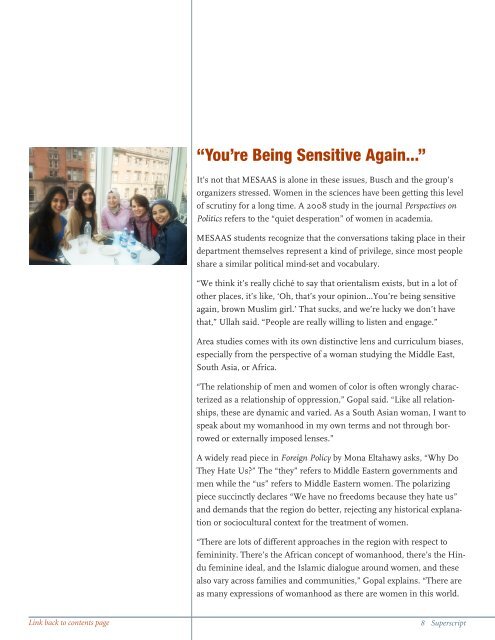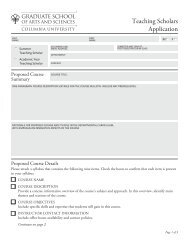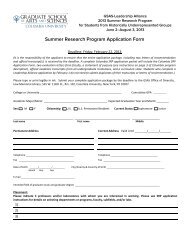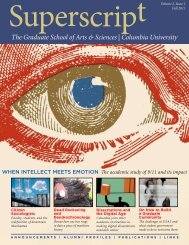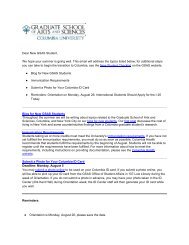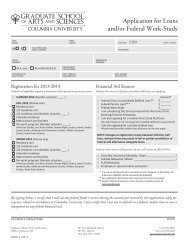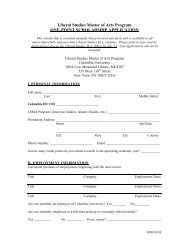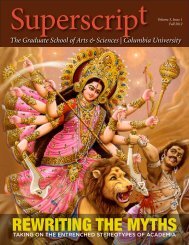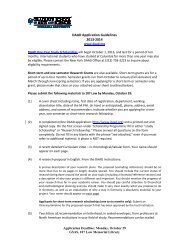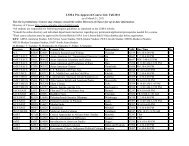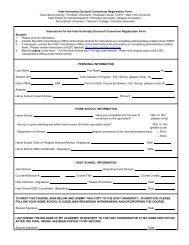PDF for Printing - Graduate School of Arts and Sciences - Columbia ...
PDF for Printing - Graduate School of Arts and Sciences - Columbia ...
PDF for Printing - Graduate School of Arts and Sciences - Columbia ...
- No tags were found...
Create successful ePaper yourself
Turn your PDF publications into a flip-book with our unique Google optimized e-Paper software.
“You’re Being Sensitive Again...”It’s not that MESAAS is alone in these issues, Busch <strong>and</strong> the group’sorganizers stressed. Women in the sciences have been getting this level<strong>of</strong> scrutiny <strong>for</strong> a long time. A 2008 study in the journal Perspectives onPolitics refers to the “quiet desperation” <strong>of</strong> women in academia.MESAAS students recognize that the conversations taking place in theirdepartment themselves represent a kind <strong>of</strong> privilege, since most peopleshare a similar political mind-set <strong>and</strong> vocabulary.“We think it’s really cliché to say that orientalism exists, but in a lot <strong>of</strong>other places, it’s like, ‘Oh, that’s your opinion...You’re being sensitiveagain, brown Muslim girl.’ That sucks, <strong>and</strong> we’re lucky we don’t havethat,” Ullah said. “People are really willing to listen <strong>and</strong> engage.”Area studies comes with its own distinctive lens <strong>and</strong> curriculum biases,especially from the perspective <strong>of</strong> a woman studying the Middle East,South Asia, or Africa.“The relationship <strong>of</strong> men <strong>and</strong> women <strong>of</strong> color is <strong>of</strong>ten wrongly characterizedas a relationship <strong>of</strong> oppression,” Gopal said. “Like all relationships,these are dynamic <strong>and</strong> varied. As a South Asian woman, I want tospeak about my womanhood in my own terms <strong>and</strong> not through borrowedor externally imposed lenses.”A widely read piece in Foreign Policy by Mona Eltahawy asks, “Why DoThey Hate Us?” The “they” refers to Middle Eastern governments <strong>and</strong>men while the “us” refers to Middle Eastern women. The polarizingpiece succinctly declares “We have no freedoms because they hate us”<strong>and</strong> dem<strong>and</strong>s that the region do better, rejecting any historical explanationor sociocultural context <strong>for</strong> the treatment <strong>of</strong> women.“There are lots <strong>of</strong> different approaches in the region with respect t<strong>of</strong>emininity. There’s the African concept <strong>of</strong> womanhood, there’s the Hindufeminine ideal, <strong>and</strong> the Islamic dialogue around women, <strong>and</strong> thesealso vary across families <strong>and</strong> communities,” Gopal explains. “There areas many expressions <strong>of</strong> womanhood as there are women in this world.Link back to contents page8 Superscript


